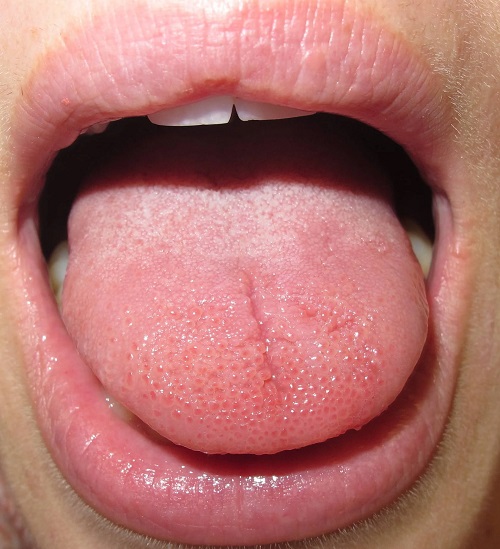Learn the causes and solutions for ‘Why Does My Tongue Feel Like Sandpaper?’ in this comprehensive guide below!
Imagine waking up one morning with a peculiar sensation in your mouth and wondering—Why Does My Tongue Feel Like Sandpaper! It’s not only uncomfortable but also a cause for concern. Here are the common reasons and solutions to go about it!
Learn about Seasoning Cast Iron with Coconut Oil here
Why Does My Tongue Feel Like Sandpaper?
Before exploring the reasons behind a sandpaper-like tongue, let’s decode the tongue’s anatomy. Comprising muscles, the tongue is covered by a mucous membrane, and small nodules called papillae. When these papillae become inflamed or altered, the texture of your tongue may change, often giving rise to a gritty sensation. Here are the potential reasons behind—‘Why Does My Tongue Feel Like Sandpaper’!
1. Dry Mouth
Dry mouth, or xerostomia, occurs when your salivary glands fail to produce enough saliva which acts as a natural lubricant, facilitating speech, digestion, and oral hygiene. Without adequate saliva, your tongue can feel dry, rough, and yes—like sandpaper.
Saliva has a buffering action that helps maintain a neutral pH level in the mouth. When saliva production decreases, acidity may rise, leading to irritation and a rough texture on the tongue. Factors like medications, stress, and specific medical conditions can exacerbate this problem.
2. Dehydration
Dehydration can drastically reduce your body’s ability to produce saliva, which in turn makes your tongue feel rough and abrasive.
When dehydrated, the body allocates water to vital organs and processes, often neglecting less critical systems like saliva production. This shift leads to a decrease in moisture levels in the mouth, causing your tongue to feel like sandpaper.
3. Medications
Certain medications, particularly antihistamines, antipsychotics, and diuretics, can cause dry mouth as a side effect, making your tongue feel abrasive.
These medications can alter the neural control of salivary glands, suppressing the secretion of saliva. This reduced salivary flow can result in your tongue adopting a sandpaper-like texture.
4. Mouth Breathing
Breathing through your mouth, particularly during sleep, can dry out your tongue and mouth, creating that gritty sensation.
Air flowing directly over the tongue can cause rapid evaporation of saliva, leaving the tongue dry. This situation is similar to how wind dries out your skin, just that in this case, it’s affecting your oral cavity.
5. Oral Health
A lack of proper oral care can lead to bacterial buildup on your tongue, making it feel like sandpaper.
Your tongue is a natural habitat for microorganisms. When not cleaned regularly, dead cells, food particles, and bacteria accumulate on the tongue’s papillae, causing it to feel rough.
6. Burning Mouth Syndrome
In rare cases, Burning Mouth Syndrome (BMS) can cause your tongue to feel like sandpaper.
BMS often affects postmenopausal women and can cause a variety of oral sensations, including dryness and an abrasive texture. The exact cause is still under research, but it’s believed to involve the dysfunction of nerves responsible for taste and oral sensation.
Get the Best Castor Oil vs. Argan Oil Guide here
Practical Solutions
1. Stay Hydrated
Ensure you’re drinking an adequate amount of water throughout the day. Dehydration is a common cause of dry mouth and a rough tongue. Aim for at least 8-10 cups of water daily, and more if you’re in a hot or dry environment.
2. Ensure Optimal Humidity Around the Place
A study published in the International Journal of Pediatric Otorhinolaryngology found that using a humidifier can improve symptoms related to dry mouth.
Use a humidifier in your bedroom, especially during dry seasons or in climates with low humidity. This can help combat mouth dryness, particularly if you tend to breathe through your mouth during sleep.
3. Maintain Oral Hygiene
Maintain excellent oral hygiene by brushing your teeth and tongue regularly. Use a tongue scraper to remove any accumulated bacteria or dead cells on the tongue’s surface. A cleaner tongue is less likely to feel rough.
4. Avoid Irritants
Stay away from tobacco products and excessive alcohol consumption, as they can contribute to mouth dryness and tongue discomfort.
5. Try Saliva Stimulants
Chewing sugar-free gum has been proven to stimulate saliva production, as per research published in the Journal of the American Dental Association. Consider chewing sugar-free gum or using sugar-free candies to stimulate saliva production.
6. Limit Mouth Breathing
If mouth breathing is a concern, consult with a healthcare professional to identify and address the root cause. This might involve treatment for allergies, nasal congestion, or other factors that lead to mouth breathing.
7. Review your Existing Medication by a Professional
If medications are contributing to your dry mouth and sandpaper-like tongue, discuss potential alternatives or dosage adjustments with your healthcare provider. In some cases, they may recommend switching to a different medication with fewer side effects.
Learn about the Benefits of Castor Oil for Eyelashes here
When to Seek Medical Help?
If your tongue continues to feel like sandpaper despite trying the recommended solutions, or if this symptom is accompanied by other concerning signs such as pain, swelling, changes in taste, or difficulty swallowing, know that its time to seek professional medical advice immediately.
Persistent or worsening symptoms may indicate an underlying health issue that requires a more targeted treatment approach. Conditions like burning mouth syndrome, autoimmune diseases, or even certain oral cancers can manifest with symptoms similar to a sandpaper-like tongue.
A healthcare provider can conduct a comprehensive evaluation, which may include tests or imaging studies, to diagnose the underlying condition accurately. Ignoring persistent symptoms can lead to complications; therefore, timely medical intervention is essential for both diagnosis and treatment.
Conclusion
A sandpaper-like tongue may not be a serious health concern, but it often signals underlying issues worth addressing. Whether it’s simple dehydration or a side effect of medication, recognizing the cause is the first step towards effective treatment and a more comfortable oral experience.
Always consult healthcare professionals for a proper diagnosis and personalized treatment plan if you experience persistent symptoms.
Get the Best Castor Oil vs. Coconut Oil Guide here
FAQs
1. Why Does My Tongue Feel Like Sandpaper When I Wake Up In The Morning?
Waking up with a rough tongue can be attributed to various factors, with dry mouth being a common one. Overnight, saliva production decreases, leaving your tongue dry and rough. Mouth breathing during sleep can also contribute to this sensation.
Ensuring you’re well-hydrated and addressing potential causes of dry mouth or mouth breathing can help alleviate this discomfort.
2. Are There Specific Foods Or Beverages That Can Worsen The Feeling Of A Rough Tongue?
Certain foods and drinks, such as highly caffeinated beverages and alcohol, can contribute to dehydration and exacerbate the sensation of a sandpaper-like tongue. Reducing your consumption of these items and increasing your water intake can help prevent this discomfort.
3. Is A Sandpaper-Like Tongue A Sign Of A Serious Medical Condition?
In many cases, a rough tongue is not indicative of a severe medical condition. However, it can be a symptom of an underlying issue, such as dry mouth due to medication side effects or mouth breathing.
If the sensation persists, is accompanied by other concerning symptoms, or significantly impacts your daily life, it’s advisable to consult with a healthcare professional for a proper evaluation.
4. Can I Use Over-The-Counter Products Like Mouthwash Or Lozenges to Relieve A Rough Tongue?
Over-the-counter products, such as alcohol-free mouthwash and sugar-free lozenges, can provide temporary relief by promoting saliva production and maintaining oral moisture. These products can be helpful, but they may not address the root cause of the issue.
If a sandpaper-like tongue is a recurring or persistent problem, it’s important to consult with a healthcare provider to determine and address the underlying cause



